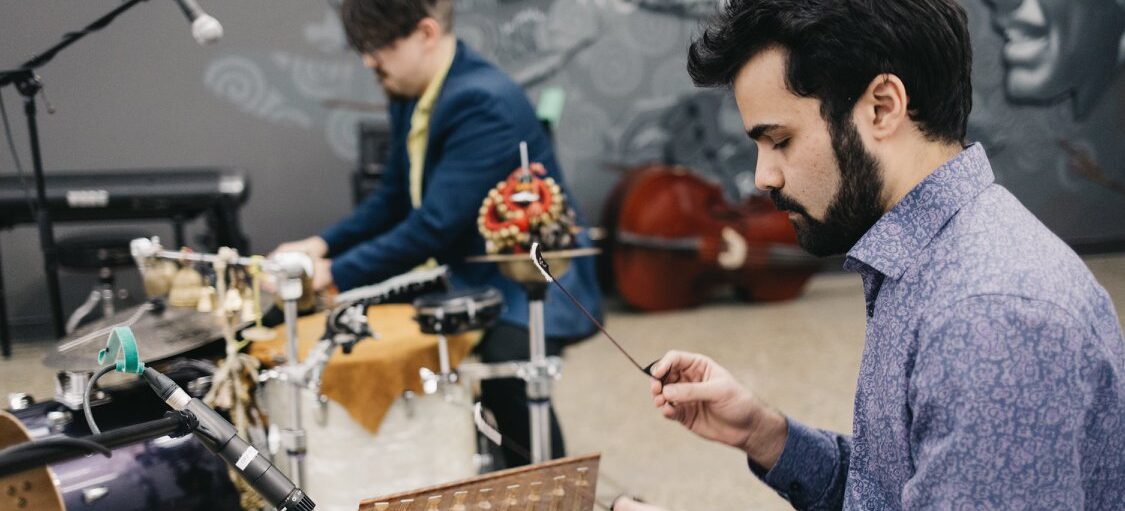Farhad Khosravi is a santur player and composer from Isfahan, Iran. His album “Mosàfer,” the 2020 Edmonton Music Prize winner, is a “musical journey through the stages of life, from the day of creation to the day of passing.”
Hayat Life Editor-in-Chief Fira Gasimova spoke with Khosravi about his award-winning works and musical inspirations.
Khosravi talks about where his interest in the santur originated.
Gasimova: So, you were born in Iran. Do you visit?
Khosravi: I’ve visited twice in the past 12 years. I am a member of the Bahá’í Faith, which is one of the religions persecuted in Iran. Because of this and other reasons, it is not quite safe to travel. However, I would love to visit because Iran is also the birthplace of the Bahá’í Faith.
Gasimova: How were you first introduced to the santur, and what about the instrument did you enjoy? What made you want to pursue a professional career?
Khosravi: In Iran, the santur is a very common instrument. It’s like piano; everybody knows it. I was 12–13 years old when my mom was going to sign my sisters up for music lessons. I just tagged along, but she asked, “Do you want to sign up for any instrument?” I chose the santur because it was the only instrument I had seen at that point in person. One of my mom’s family members used to play it. It started as just an activity for me. But when I went to university, I met people who were playing professionally, and it made me want to pursue that too.
There’s a point where you don’t know if you’re professional or not. But there were certain things I wanted to talk about with my music. I wanted to talk about child labor; in Iran, it was very common to see children on the streets, so that was my first project.
 Khosravi delves into some of his well-known projects.
Khosravi delves into some of his well-known projects.
Gasimova: I read that you worked on the play, “Anahita’s Republic.” What was that experience like? How did you come across the opportunity?
Khosravi: One of the writers, Hengameh, visited Iran around 2009, after a rigged and engineered election. She observed how the people reacted to the election, women’s rights, and government suppression. Hengameh wanted to put what she witnessed into a play. Hengameh and her husband came to one of my concerts and asked me to write the music for their production. I really enjoyed writing music for stories, film, and theater. It was a great experience, trying to capture the main character’s feelings through music.
Gasimova: It sounds like a very powerful play! I read that you won the 2020 Edmonton Music Prize for your album “Mosàfer.” What did the recognition of that award mean to you, especially considering that was the album you won it for.
Khosravi: It was the first major prize I won. Of course I was excited! I was not expecting it for this album. Before creating the album, I played some of the songs live at different concerts. People told me they really liked the pieces, saying, “I wish you would record them.” After hearing it multiple times, I recorded them and applied for the award. As a musician, I don’t like to focus on awards because, whether you get it or not, it creates struggles for artists. Whether a good or bad outcome, if you’re very successful, then you might struggle to recreate your success.
However, I realized it’s important to seek these awards because that’s a major way you can promote your music. After I received that award, a lot more opportunities came to me.
Khosravi on Iranian-Persian and Bahá’í Faith influences.
Gasimova: Are there additional influences from Iranian-Persian culture or Muslim culture that you’re inspired by?
Khosravi: Persian literature is one of my biggest sources of inspiration. In my album “Mosàfer,” some of the songs are based on pieces of poetry that I like. Even though you don’t hear the poetry, they’re still present in the story of the music.
I love Western European classical music, especially from the early to mid-romantic era. I’d really like to mix the cultures! I’m about to finish a project I’ve been working on for the past couple of years. It’s a set of compositions, inspired by literature, written for the santur and a string quartet. I’m really excited about it because I really love string quartets. Hopefully, by the end of 2024, I will record it. So stay tuned for that.
When I discovered the Bahá’í Faith, there were so many writings promoting art. There is a writing from ‘Abdu’l-Bahá where he says: “What bestowal could be greater than this, that one’s art should be even as the act of worshiping the Lord? That is to say, when thy fingers grasp the paintbrush, it is as if thou wert at prayer in the Temple.” To me, that’s one way of worshiping God: the more the art is perfected, the closer you get to God. These writings made me realize that studying arts and sciences is a way for us to get closer to a higher reality we don’t have access to.



